In a sport often lambasted for building fights that frequently fall apart, one punishing prospect is determined to climb the ladder with pace and boundless potential. Calling on the reigning world champions after his professional debut, Uzbekistan’s undefeated, blue chip amateur, Israil Madrimov (2-0, 2KOs) is on a mission to capture boxing’s top prize.
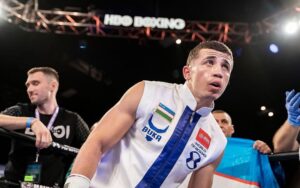
Revealing the source of his confidence when speaking to Craig Scott with the assistance of his managers, Vadim Kornilov and Alik Frolov, Madrimov discusses leaving the family home, struggling without basic, liveable amenities and pursuing one of the loneliest sporting endeavours.
Currently promoted by World of Boxing, the Russian outfit responsible for the flawless rise of light-heavyweight world champion, Dmitry Bivol and former heavyweight champion, Alexander Povetkin, the young man from Khiva was in safe hands. He’d also recently inked a co-promotional deal with Eddie Hearn’s Matchroom Boxing – a result of two electrifying stoppage victories in the last seven months, beating opponents with a combined record of thirty-four wins and only four defeats.
Followers of the sport had turned their heads, particularly following his latest outing, a destructive second round demolition of Frank Rojas.
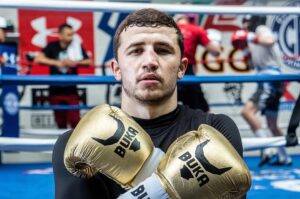
Now based in Indio, California, the twenty-four year old dubbed ‘The Dream’ was thousands of miles from his humble upbringing in Khiva, the eldest of three siblings. Boxing started thirteen years ago, with Madrimov becoming national champion less than two years after lacing up his first glove, finding himself at home in the dusty, minimalist setting of the local gym. Neither his family or the club had much in the way of financial backing, but Israil explained in depth, his memories of life in Uzbekistan.
“It was tough. It’s a different world, it’s hard to explain. People in the USA [where I live now], they probably wouldn’t understand the place I was living and was growing up. My house was in the Khiva region – it is a village type place. My house didn’t have a heater, we had a wood burning stove, so everyday I had to collect the wood for the fire. At winter time, it was much harder. For four or five months a year, we had no running water and at winter time we had no electricity at all. So, it wasn’t easy. I’m the oldest son. My family; my mother, dad, and younger brother and sister, we are very close to each other and they were always very supportive.”
Boxing has enjoyed a recent resurgence in the Eastern Bloc, with former Soviet nations such as Kazakhstan and Ukraine joining Uzbekistan in producing a crop of talented, aggressive fighters. Even nations such as Mongolia have shifted their focus towards the sport, with the Eastern sector previously preferring a grappling-heavy syllabus, training elite Judoka or Sambo players, year in, year out.
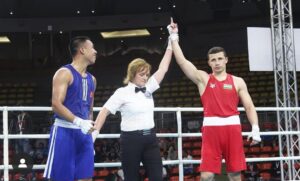
Joining dazzling Uzbek stars such as Shojahon Ergashev and Shakhram Giyasov, the young Madrimov was proud to represent the green, white and blue of the sovereign state. No stranger to wearing the national vest, he’d taken to the ring an incredible number of times as an amateur, winning far more than he’d lost. To rise from the struggle of their deprived home in Khiva was an achievement in itself, but it was just the beginning.
Israil explained, “I’m a regular kid, from a poor family, who hadn’t seen anything and no one gave me a chance. But I’m dreaming big and working hard – I won’t settle for average. At the end of the day, if those guys holding the belts did it, why can’t I? And if I can, all those other kids all over the world can, too!
“I had three-hundred and thirty amateur fights with only fifteen or twenty losses. The most important part of my amateur career was my coach, Tulkin Kilichev. He told me everything [I needed to know], he taught me and played a huge part in my life and gave me a lot experience. I was participating in all types of championships and tournaments all over the world. I can’t say something special about any tournament [in particular], I’m happy with all of my victories and was humble with my losses.”
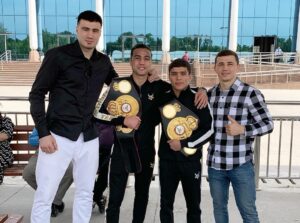
“Uzbekistan has not only Shakhram [Giyasov], but also Murodjon Akhmadaliev, [Bakhodir] Jalolov, [Elnur] Abduraimov and [Bektemir] Melikuziev. We are all professionals now. What is more important, we are all still together, still one team and I hope that we will make our country proud. We will all become world champions! All of our people in Uzbekistan are very supportive towards us and always pray for us and cheer. They always meet us and treat us as [though we are] special. All I want to do is to prove that if you work hard and if you have a dream, you can make it work. There is nothing special about me.”
Some of the sport’s keenest observers would argue that Madrimov is, infact, a special talent. Despite playing down his own ability, he’d made a name for himself since that long awaited professional debut in November of last year. It was his continuing call for world titles that seemingly contradicted the reserved retelling of his own story, but on further discussion, self belief and ambition appeared his only driving force.
Both of his opening contests had been scheduled for ten rounds, almost unheard of. His trainer Joel Diaz had claimed Madrimov would stop Mexican champion, Jaime Munguia in six rounds after his professional debut – something Diaz’ charge completely agreed with. But it didn’t matter to him whether it was the Goldenboy star, Philadelphia’s WBC champion, Tony Harrison or newly crowned unified champion, Julian Williams. First come, first served.
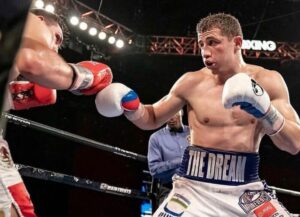
“I would say that I’m always very confident in myself, my skills and my power. It doesn’t mean that I’m over confident and it doesn’t mean that I do not respect Jaime. I respect him a lot, he is the world champion, one of the best in my division, but that doesn’t mean that he’s unbeatable. Yes, he has twenty-five fights for example, but on the other hand, I have over three hundred amateur fights and six WSB fights against the best fighters in the world. I think we have pretty similar experience. Of course, he knows what is it to go twelve rounds and I don’t, but I’ve tried. I sparred three guys for fourteen rounds with only thirty seconds rest and I did well. Plus, I have a great corner, so I’m ready to take the risk.”
The Uzbek’s refreshing approach to boxing gave hope to fans expecting elite amateurs to step up in class early. Former Olympians battling journeymen for their first five or six fights had become the norm, despite the vast experience held, regardless of rounds or scoring systems. Israil was determined to race to the top of the light-middleweight division, with his management team trying their best to let him off the leash.
Now ranked sixth in the world by the WBA after capturing their inter-continental title in the fight with Rojas, he was ready to push on. The former Asian Olympic Games and Asian Games gold medalist had sealed a silver at the World Amateur championships in 2011, as a seventeen-year old prodigy. Andrey Ryabinsky, on signing Madrimov to World of Boxing explained that the young talent must have been ‘born a professional fighter’. It certainly looked that way.
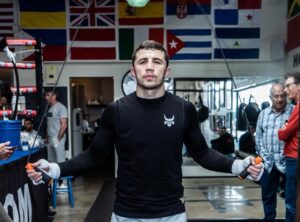
“When we first met, I told Vadim and Alik [Frolov] that I’m ready for any type of challenge in my first fight and that I’m willing to fight for the world title in my first fight”, Madrimov told me. “At that time, I didn’t know how it works. They told me that it would be really hard to make, but they will try to find the best fight. We chose the way, we found the vacant major title [with the WBA], because not one of the regional champions at the moment would accept the fight. My team chose the opponent who was ranked number forty in the world at that time. He was not our first choice, but he was the one who accepted the challenge.”
“I want people to see my performances and enjoy them. My goal is those world titles, but to get them you need to be well known, that’s why it will help me to be recognised by boxing fans all over the world. I hope it will help me get the fights that I want. I’m very grateful and pleased that my promoter, World of Boxing, and my manager could make the deal with Matchroom and DAZN for all of my fights to be seen all over the world. My first fight was on the TV giant HBO and now I’m on this new, mainstream boxing platform. This is the most important thing for me.”
Next out this weekend on the bill topped with Gennady Golovkin’s return, it was another ten round fight, this time with Norberto Gonzalez – another opponent with a winning record. ‘The Dream’ had to bide his time, focusing on sharpening his skills whilst the big fights potentially come to fruition. From discussing his plans for world domination, you got the sense he wasn’t best suited for playing the waiting game. Rome wasn’t built in a day, but if Madrimov had been in charge, it might have been ahead of schedule.
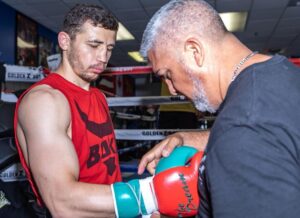
The boy who collected wood in the dark for the family fire at home in Khiva was desparate to achieve. He’d secured the backing of boxing’s major players and grasped his opportunity with both hands, creating headlines and highlight reels. With power in both hands and confidence to burn, Madrimov seemed certain that boxing was in his blood. Only time will tell – and he seemed to fancy his chances, even fighting the clock.
“I only have one goal. There is no timeline for me, I only want to fight. I want to fight the best fights and the best opposition. I want to give people a great performance each time I step in the ring and – of course – I hope to get these title shots very soon.”
Interview written by: Craig Scott
Follow Craig on Twitter at: @craigscott209